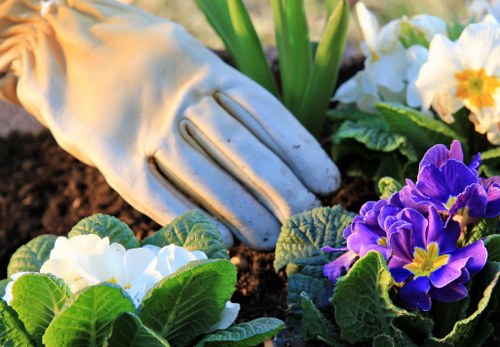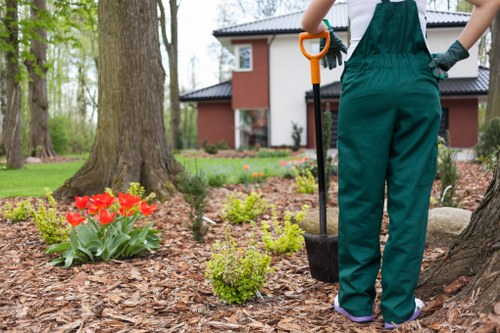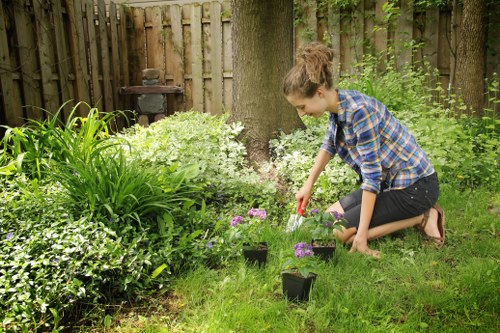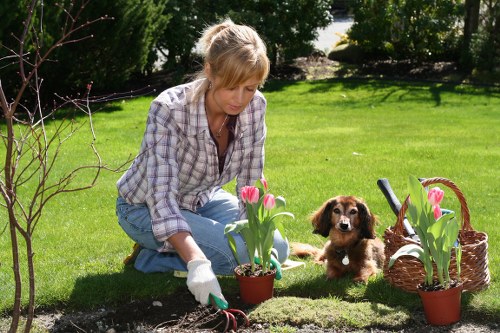Gardening in Inglewood: Cultivating Green Spaces in the Heart of California
Introduction to Gardening in Inglewood

Gardening in Inglewood offers residents a unique opportunity to create vibrant and sustainable green spaces in a bustling urban environment. Whether you're a seasoned gardener or a beginner, Inglewood's climate and community resources make it an ideal place to cultivate your garden.
The city's mild Mediterranean climate provides optimal conditions for a wide variety of plants, from colorful annuals to sturdy perennials. Additionally, local gardening clubs and community gardens offer support and inspiration for enthusiasts of all levels.
Urban gardening in Inglewood not only enhances the aesthetic appeal of neighborhoods but also contributes to environmental sustainability by promoting biodiversity and reducing the urban heat island effect.
Choosing the Right Plants for Inglewood

Selecting the appropriate plants is crucial for a thriving garden in Inglewood. Given the region's warm summers and mild winters, drought-tolerant and heat-resistant plants are particularly well-suited.
Consider native plants such as California lilac, manzanita, and succulent varieties. These plants are adapted to the local climate, requiring less water and maintenance while supporting local wildlife.
Additionally, incorporating a mix of flowering plants and edibles can create a diverse and productive garden. Vegetables like tomatoes, peppers, and herbs flourish in Inglewood's climate, providing fresh produce for your household.
Soil Preparation and Maintenance

Healthy soil is the foundation of a successful garden. In Inglewood, it's important to test your soil to determine its pH and nutrient levels. Amending the soil with organic matter, such as compost or aged manure, can improve its structure and fertility.
Regular maintenance practices, including mulching, weeding, and proper watering, are essential for maintaining soil health. Mulching helps retain moisture, regulate soil temperature, and suppress weed growth, reducing the need for constant attention.
Implementing a consistent watering schedule, preferably in the early morning or late evening, ensures that plants receive adequate moisture without excessive evaporation. Drip irrigation systems can be particularly effective and water-efficient.
Garden Design and Layout

A well-planned garden design enhances both functionality and beauty. Start by assessing the available space and sunlight exposure in your Inglewood garden. Create a layout that accommodates your plants' needs, providing adequate spacing for growth and airflow.
Incorporate various elements such as raised beds, walkways, and seating areas to create an inviting and organized space. Using vertical gardening techniques, like trellises and vertical planters, can maximize space and add visual interest.
Consider integrating sustainable practices into your garden design. Rainwater harvesting, composting areas, and native plantings contribute to an eco-friendly and resilient garden.
Seasonal Gardening Tips

Gardening in Inglewood requires attention to seasonal changes to ensure year-round success. In the spring, focus on planting new blooms and preparing beds for summer crops. Fall is ideal for planting bulbs and perennials that will thrive in the cooler months.
Summer gardening involves careful watering and managing plant health during the hottest periods. Implementing shade structures or using shade-loving plants can help protect sensitive species from intense sunlight.
Winter in Inglewood is relatively mild, allowing for continued garden activities such as pruning and soil improvement. It's also a good time to plan your garden for the upcoming year.
Community Gardening in Inglewood

Community gardens play a significant role in fostering a sense of community and providing access to green spaces in Inglewood. These shared gardens allow residents to collaborate, share resources, and cultivate plants together.
Participating in a community garden offers numerous benefits, including social interaction, skill development, and the opportunity to grow diverse plant species. Many community gardens also host workshops and events, enhancing the gardening experience.
Additionally, community gardens contribute to local food security by providing fresh produce to participants and surrounding neighborhoods.
Pest and Disease Management

Managing pests and diseases is essential for maintaining a healthy garden. In Inglewood, common pests include aphids, caterpillars, and spider mites. Implement integrated pest management (IPM) strategies to control these issues sustainably.
IPM involves monitoring pest populations, encouraging beneficial insects like ladybugs and predatory beetles, and using organic treatments when necessary. Avoiding chemical pesticides helps protect the environment and promotes a balanced ecosystem.
Regularly inspecting plants for signs of disease and addressing issues promptly can prevent the spread of infections. Proper spacing, sanitation, and plant rotation are effective practices for minimizing disease risks.
Water Conservation Techniques

Water conservation is a vital aspect of gardening in Inglewood, where water resources can be limited. Implementing efficient watering techniques ensures that your garden thrives without wasting precious water.
Drip irrigation systems deliver water directly to the plant roots, minimizing evaporation and runoff. Installing rain barrels to collect and store rainwater provides an additional water source for your garden.
Choosing drought-tolerant plants and incorporating mulching can further reduce water usage. These practices not only conserve water but also promote healthier plant growth.
Gardening Tools and Equipment

Investing in the right gardening tools and equipment enhances efficiency and enjoyment. Essential tools for Inglewood gardeners include high-quality gloves, pruning shears, trowels, and a sturdy watering can or hose.
Consider ergonomic tools that reduce strain and are comfortable to use during extended gardening sessions. Additionally, power tools like tillers and mowers can assist in maintaining larger gardens.
Proper storage solutions, such as shed spaces or tool racks, help keep your equipment organized and protected from the elements.
Organic Gardening Practices

Embracing organic gardening practices promotes a healthy and sustainable garden in Inglewood. Organic methods focus on natural processes and materials to enhance soil fertility and plant health.
Using compost, natural fertilizers, and organic mulches improves soil structure and provides essential nutrients to plants. Companion planting and crop rotation are effective strategies for pest management and soil maintenance.
Avoiding synthetic chemicals protects beneficial insects and maintains the garden's ecological balance, resulting in a more resilient and productive space.
Urban Gardening Solutions

Urban gardening in Inglewood maximizes limited space by utilizing creative solutions. Container gardening allows you to grow plants on balconies, patios, and rooftops, providing flexibility and mobility.
Vertical gardening techniques, such as wall-mounted planters and vertical towers, optimize space and add visual interest to urban environments. Additionally, hydroponic and aquaponic systems offer innovative ways to cultivate plants without traditional soil.
These urban gardening methods make it possible to enjoy gardening regardless of space constraints, promoting green living in the city.
Gardening for Health and Well-being

Gardening offers numerous health benefits, enhancing both physical and mental well-being. Engaging in gardening activities provides moderate exercise, improving strength, flexibility, and cardiovascular health.
The therapeutic effects of gardening include stress reduction, increased mindfulness, and a sense of accomplishment. Tending to plants and watching them grow can boost mood and reduce anxiety.
Additionally, growing your own food encourages a healthier diet, promoting the consumption of fresh and organic produce.
Local Gardening Resources in Inglewood

Inglewood offers a wealth of resources to support gardeners. Local nurseries and garden centers provide a variety of plants, tools, and expert advice tailored to the region's climate.
Workshops and classes hosted by community organizations and botanical gardens offer opportunities to learn new skills and stay informed about the latest gardening trends.
Online forums and social media groups dedicated to Inglewood gardening foster a sense of community, allowing gardeners to share tips, experiences, and support.
Sustainable Gardening Practices

Adopting sustainable gardening practices in Inglewood contributes to environmental conservation and long-term garden health. Sustainable techniques focus on minimizing waste, conserving resources, and promoting biodiversity.
Implement composting to recycle organic waste into nutrient-rich soil amendments. Utilizing organic fertilizers and pest control methods reduces reliance on harmful chemicals, protecting local ecosystems.
Planting native species and creating habitat gardens support pollinators and wildlife, enhancing the garden's ecological value.
Gardening Events and Workshops

Participating in gardening events and workshops in Inglewood expands your knowledge and connects you with fellow gardening enthusiasts. These events offer hands-on learning experiences, demonstrations, and expert-led sessions on various topics.
Attend local plant sales, garden tours, and seasonal festivals to discover new plant varieties and design ideas. Workshops on topics like composting, pruning, and organic gardening provide valuable skills for maintaining a thriving garden.
Engaging in community events fosters a supportive gardening community and inspires creative approaches to your gardening endeavors.
10-15 Nearby Areas to Inglewood for Gardening Services

- Westchester: Just north of Inglewood, Westchester offers similar climate conditions and a variety of local nurseries.
- Crenshaw: Known for its community gardens, Crenshaw provides ample opportunities for collaborative gardening projects.
- Palms: Palms features spacious yards ideal for large garden layouts and diverse plantings.
- Marina del Rey: This coastal area adds a unique maritime influence to gardening styles and plant selections.
- Venice: Venice encourages eco-friendly gardening practices and innovative urban gardening solutions.
- El Segundo: El Segundo offers well-maintained public gardens and extensive gardening resources.
- South Gate: South Gate supports community-driven gardening initiatives and local plant exchanges.
- Hawthorne: Hawthorne boasts a variety of botanical gardens and educational gardening programs.
- Palmdale: A bit further out, Palmdale provides larger garden spaces and specialized gardening services.
- Compton: Compton features thriving urban gardens and active gardening communities.
- Redondo Beach: With its coastal climate, Redondo Beach offers unique plant varieties and sustainable gardening practices.
- Santa Fe Springs: Santa Fe Springs is home to several community gardens and gardening workshops.
- Carson: Carson provides extensive gardening centers and professional landscaping services.
- Gardena: Gardena encourages multicultural gardening traditions and diverse plant selections.
Conclusion

Gardening in Inglewood is a rewarding endeavor that enhances the beauty of urban living while promoting sustainability and community engagement. By selecting the right plants, practicing proper soil management, and utilizing efficient gardening techniques, residents can cultivate thriving gardens that contribute to their well-being and the environment.
Whether you're gardening in a spacious backyard or a compact balcony, Inglewood offers the resources and community support to help your green spaces flourish. Embrace the art of gardening and transform your surroundings into a lush, vibrant oasis.
Contact us today to start your gardening journey in Inglewood and let us help you create the garden of your dreams!
